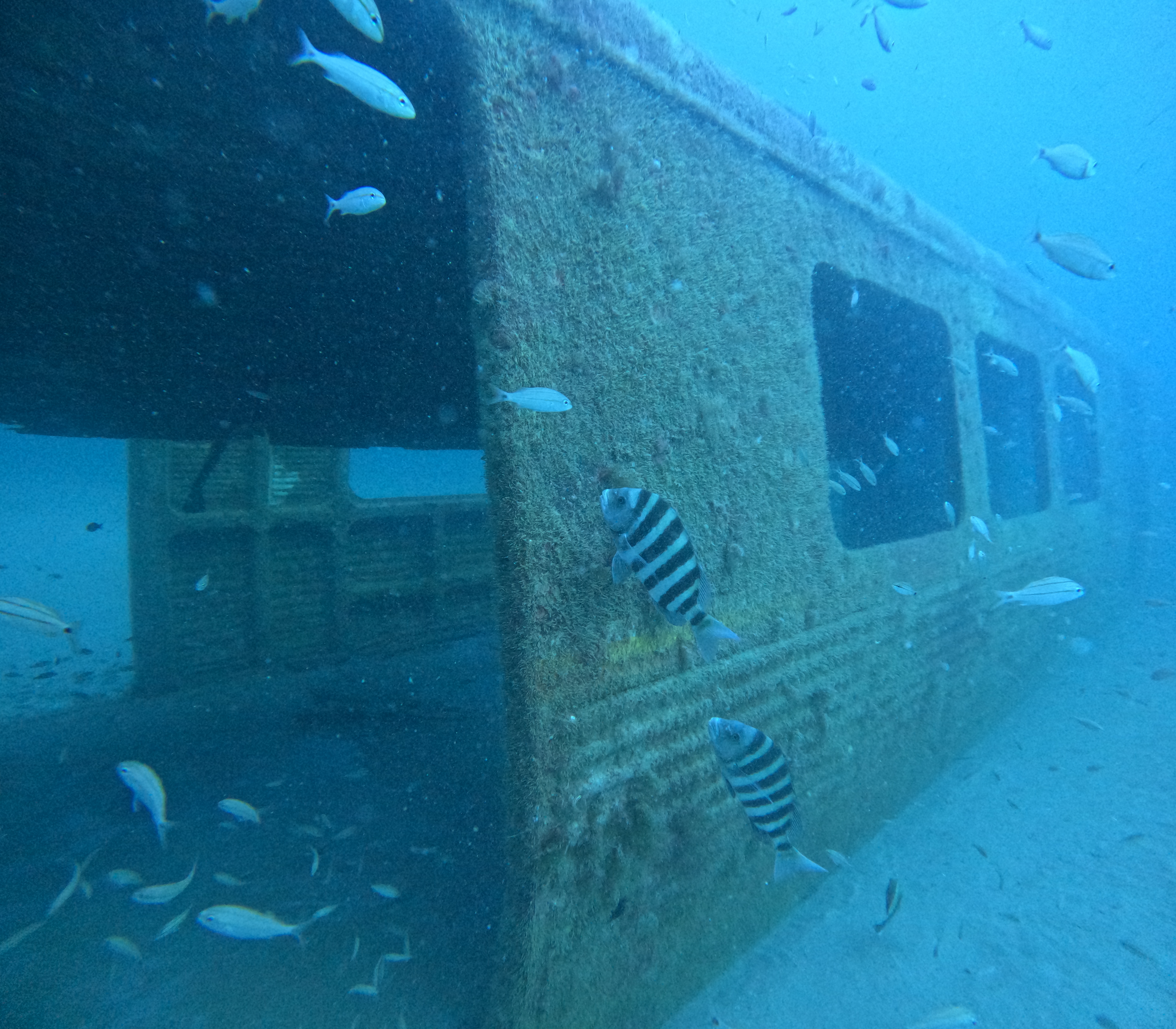Coral Reefs
See Staggering Photos of the World's Largest Coral, Newly Discovered by Scientists in the Pacific Ocean
The enormous organism is bigger than a blue whale and made up of millions of genetically identical, tiny animals called polyps
From Prolonging Wallaby Pregnancies to Disorienting Hatchling Turtles, 11 Ways Artificial Lights Affect Animals
From the busy cities to ocean waters, our need to illuminate the world has had some strange and tragic consequences
Earth Is on the Brink of Breaching a Seventh of Nine 'Planetary Boundaries' That Support Life
A new “health check” for our planet sounds an alarm bell on rising ocean acidification, which is driven by carbon dioxide levels in the atmosphere
No Longer Full of Commuters, Atlanta's Old Subway Cars Are Now Filled With Fish
Two Metropolitan Atlanta Rapid Transit Authority railcars were added to an artificial reef off the coast of Georgia to create more wildlife habitat
See 15 Stunning Images From the Ocean Photographer of the Year Awards
The winning and highly commended underwater photography spotlights breathtaking animal behavior, conservation needs and the otherworldly environment of Earth's oceans
Scientists Suggest Freezing Endangered Animals' Cells and Preserving Them on the Moon
Shadowed areas in lunar craters may be cold enough to safeguard species' DNA amid "climate disasters and social disasters" on Earth, according to Smithsonian-led research
The Valiant Effort to Restore the Caribbean's Sea Urchins
The very hungry, spiky custodians gobble up the algae that smother coral reefs
These Supercorals Are Causing Problems
As rice coral spreads it reduces biodiversity
These Innovative Landers Will Examine Coral Reefs in the Gulf of Mexico
Scientists plan to use what they learn to help restore communities harmed by the Deepwater Horizon oil spill
The World's Fourth Mass Coral Bleaching Event Is Underway—and It Could Become the Worst One Yet
The impacted reefs represent 54 percent of the planet's total, and that figure is currently increasing by 1 percent each week, NOAA scientists say
Dive Into the Exotic World of Nudibranchs, the Spectacular Slugs of the Sea
Psychedelic hedgehogs, purple pineapples, living strawberries—these tiny creatures show off their big personalities off the Australian coast
Clownfish Can 'Count' Stripes on Other Fish to Identify Intruders, Study Suggests
Notoriously aggressive, common clownfish may be using basic mathematics to determine if another fish is a friend or foe
Scientists Cryopreserve and Revive Coral Fragments in a World First for Conservation
The new freezing technique could reinvigorate corals suffering from warming oceans—or even preserve human organs in the future
Scientists Look to Ancient Hawaiian Reefs for Clues About Future Sea-Level Rise
Researchers search the shores of Molokai for fossils to help predict the impact of melting ice sheets on our oceans
These Long, Skinny Fish Hide Behind Bigger Fish to Sneak Up on Their Prey
Scientists made 3D-printed models of fish and tested them in the ocean to study this clever hunting strategy
Water Temperatures Hit 'Hot Tub' Levels in the Florida Keys
A buoy in Manatee Bay recorded 101.1 degrees Fahrenheit on Monday evening, as coral reefs suffer
This Pacific Coral Can Withstand Warming Waters With the Help of Algae
The heat-resistant organism in antler coral may help it adapt as ocean temperatures increase
Coral Reefs Host a Vast Diversity of Microbes
A two-year expedition at sea uncovered more than half a million varieties of microbial life in Pacific reef-dwelling organisms
Scientists Solve a Sea Urchin Murder Mystery
A microscopic parasite that has been killing the Caribbean creatures since last year might also be at fault for a population collapse four decades ago
See the Pristine Coral Reefs Found off the Galápagos Islands
These ancient deep-sea reefs have barely been affected by humans and can provide a way to measure the impact of climate change on corals
Page 1 of 9
:focal(3000x2000:3001x2001)/https://tf-cmsv2-smithsonianmag-media.s3.amazonaws.com/filer_public/57/7a/577afb3b-9df3-415b-8f04-220c80031cd2/06_-_ngsps2024sol_msf_2532nat_geographic.jpg)
:focal(800x602:801x603)/https://tf-cmsv2-smithsonianmag-media.s3.amazonaws.com/filer_public/b4/8a/b48a813a-d19e-4e6e-b11e-1077e6aae289/gettyimages-1300311849_web.jpg)
:focal(1500x1400:1501x1401)/https://tf-cmsv2-smithsonianmag-media.s3.amazonaws.com/filer_public/39/2d/392d87f9-6d4d-4fd2-b9f4-1c4c68afaab2/oceanimagebank_tobymatthews_20.jpg)

:focal(3163x2331:3164x2332)/https://tf-cmsv2-smithsonianmag-media.s3.amazonaws.com/filer_public/f9/96/f99660a5-7892-4cb0-93ba-51382537d990/jake_wilton_c.jpg)
:focal(335x191:336x192)/https://tf-cmsv2-smithsonianmag-media.s3.amazonaws.com/filer_public/9b/b3/9bb31979-ca72-4d7e-8451-184a72b98133/lroc-moon-south-pole-illumination-2-670x380.png)
:focal(800x602:801x603)/https://tf-cmsv2-smithsonianmag-media.s3.amazonaws.com/filer_public/ea/12/ea12769c-1e39-4a1c-ba8e-0c315851506d/header-uncropped-urchin-resoration_web.jpg)
:focal(350x263:351x264)/https://tf-cmsv2-smithsonianmag-media.s3.amazonaws.com/filer_public/5b/a6/5ba6aa87-3ac8-43ae-9d4d-5586e76286ae/reef0607.jpg)
:focal(800x602:801x603)/https://tf-cmsv2-smithsonianmag-media.s3.amazonaws.com/filer_public/dc/15/dc1546eb-fd7c-41cf-b865-b65265ddb34e/img_1306_web.jpg)
:focal(1063x708:1064x709)/https://tf-cmsv2-smithsonianmag-media.s3.amazonaws.com/filer_public/7f/77/7f7737cf-9909-41bd-8ac1-4196d0223e0b/gettyimages-1214651199.jpg)
:focal(1728x1053:1729x1054)/https://tf-cmsv2-smithsonianmag-media.s3.amazonaws.com/filer_public/10/e9/10e92871-2646-4dfc-87e2-20ea31a0203e/goniobranchus_sp_photo_by_michael_aw_awm9156_copy.jpg)
:focal(1100x754:1101x755)/https://tf-cmsv2-smithsonianmag-media.s3.amazonaws.com/filer_public/8d/ba/8dba8078-171f-439f-bc37-9606743adf83/amphiprion_ocellaris_clown_anemonefish_by_nick_hobgood_1.jpg)
:focal(700x473:701x474)/https://tf-cmsv2-smithsonianmag-media.s3.amazonaws.com/filer_public/d9/8d/d98dda01-60d6-43df-be56-93374524fa40/cura0342.jpg)
:focal(800x602:801x603)/https://tf-cmsv2-smithsonianmag-media.s3.amazonaws.com/filer_public/55/2d/552dd7c3-d231-49ef-a8e3-575e95e8b519/geochemist-blake-dyer_web.jpg)
:focal(2600x1758:2601x1759)/https://tf-cmsv2-smithsonianmag-media.s3.amazonaws.com/filer_public/19/bd/19bd7deb-c0aa-44b1-8e5f-9386d717d8e6/gettyimages-146140976.jpg)
:focal(2304x1733:2305x1734)/https://tf-cmsv2-smithsonianmag-media.s3.amazonaws.com/filer_public/96/a1/96a1524a-23c0-41cf-812d-daba2ff9c703/gettyimages-1532805839_1.jpg)
:focal(800x602:801x603)/https://tf-cmsv2-smithsonianmag-media.s3.amazonaws.com/filer_public/c5/60/c5606e92-b25e-417a-adc6-0a15a047420d/forweb_coral_gettyimages-1033860472_web.jpg)
:focal(1713x1174:1714x1175)/https://tf-cmsv2-smithsonianmag-media.s3.amazonaws.com/filer_public/6a/35/6a355c3e-e2c3-4ef0-90fe-cf7facd5086e/gettyimages-51998444.jpg)
:focal(2808x1872:2809x1873)/https://tf-cmsv2-smithsonianmag-media.s3.amazonaws.com/filer_public/76/e2/76e29cbd-b18b-4941-b5cc-9a3deba85abc/sea_urchin_photo.jpg)
:focal(400x229:401x230)/https://tf-cmsv2-smithsonianmag-media.s3.amazonaws.com/filer_public/20/aa/20aa30d0-205e-4e2f-9665-3d7fbf1ef7de/my_project.jpg)